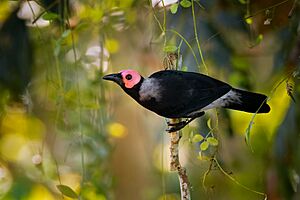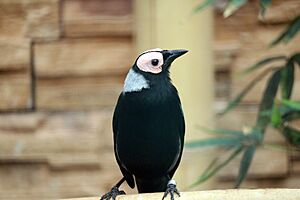Coleto facts for kids
Quick facts for kids Coleto |
|
|---|---|
 |
|
| Conservation status | |
| Scientific classification | |
| Genus: |
Sarcops
|
| Species: |
calvus
|
| Synonyms | |
|
Gracula calva Linnaeus, 1766 |
|
The coleto (Sarcops calvus) is a unique bird from the starling family. It's the only bird in its special group, called Sarcops. You can only find the coleto in the Philippines, which means it's endemic there. It loves living in warm, wet forests, like those found in lowlands or on mountains. In the Philippines, people call this bird kuling or koleto, and in some areas, it's known as the sal-ing.
How the Coleto Got Its Name
The coleto's scientific name, Sarcops calvus, has an interesting history. In 1766, a Swedish scientist named Carl Linnaeus officially named this bird Gracula calva. He used the word calvus, which is Latin for "bald" or "without hair." This name likely refers to the coleto's bare skin around its face.
Later, in 1875, an English bird expert named Arthur Walden created the special group, or genus, called Sarcops just for this bird. The name Sarcops comes from ancient Greek words: sarx (meaning "flesh") and ōps (meaning "face"). This also describes the coleto's unique face.
Different Types of Coleto
There are three main types, or subspecies, of the coleto. They look very similar but live in different parts of the Philippines:
- S. c. calvus: This type lives in the northern Philippines.
- S. c. melanonotus: You can find this type in the central and southern Philippines.
- S. c. lowii: This type lives in the Sulu Archipelago, which is in the southwest Philippines.
Coleto's Breeding Habits
Scientists recently found out that the coleto is a host for another bird called the Asian Koel (Eudynamys scolopaceus) in the Philippines. This means the Asian Koel is a "brood parasite." A brood parasite is a bird that lays its eggs in another bird's nest, letting the host bird (in this case, the coleto) raise its chicks!



